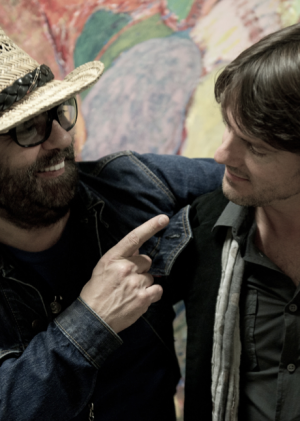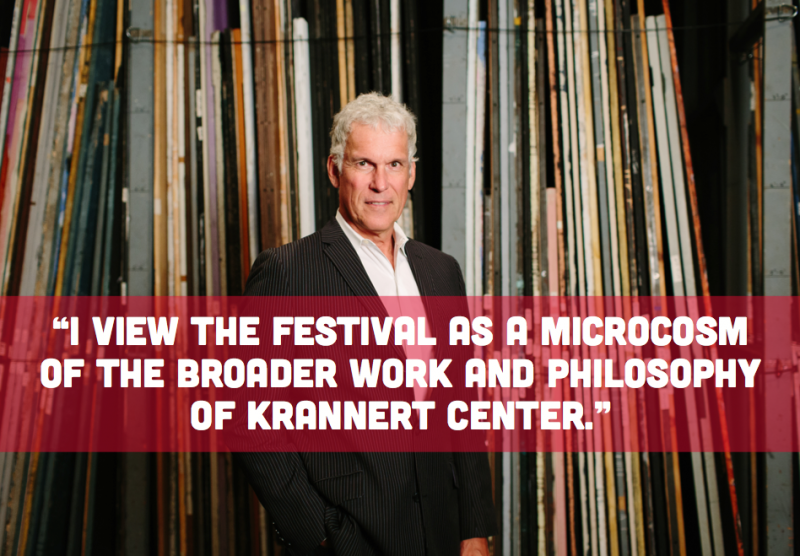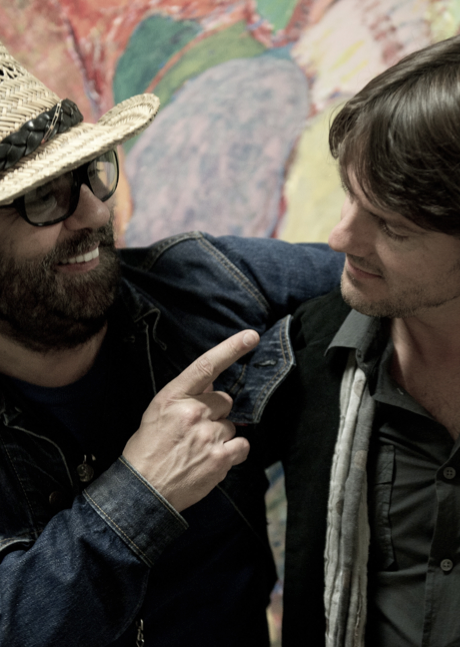 Since its completion in 1969, the Krannert Center has become the country’s leading university-based establishment for the presentation of the performing arts. The massive complex is home to over 300 artistic performances a year and is itself a work of art. Through the front doors, the lobby’s 1.5 acres of polished teakwood floor stretch out in all directions, leading the patron to one of Krannert Center’s five indoor performance spaces: Colwell Playhouse, Tryon Festival Theatre, Foellinger Great Hall, Stage 5, and the Studio Theatre. Tucked away indiscriminately across from the Center’s Intermezzo café is a tribute to Ellnora and Herman Krannert.
Since its completion in 1969, the Krannert Center has become the country’s leading university-based establishment for the presentation of the performing arts. The massive complex is home to over 300 artistic performances a year and is itself a work of art. Through the front doors, the lobby’s 1.5 acres of polished teakwood floor stretch out in all directions, leading the patron to one of Krannert Center’s five indoor performance spaces: Colwell Playhouse, Tryon Festival Theatre, Foellinger Great Hall, Stage 5, and the Studio Theatre. Tucked away indiscriminately across from the Center’s Intermezzo café is a tribute to Ellnora and Herman Krannert.
Mr. Krannert graduated from the University of Illinois in 1912 and went on to a widely successful entrepreneurial career. He and Ellnora became philanthropists, donating millions to universities and hospitals across the Midwest. Their gift of $16 million to the University of Illinois in 1964 funded the construction of Krannert Center, a project that Ellnora was particularly influential in developing: “Her revolutionary philosophy was instrumental in the design of Krannert Center, and since 1969 it has been our guid- ing principle in bringing a global community together to share life-affirming experiences.” While I doubt that she could have ever imagined a guitar festival being named for her, ELLNORA: The Guitar Festival exists as a loving tribute to Mrs. Krannert’s generosity, vision, and inspiration.
This history of ELLNORA is also a history of the friendship and collaboration of Krannert Center director Mike Ross and music producer and curator David Spelman. Their acquaintance began in the late nineties in New York, where each was serving in various capacities in the arts community. Ross and Spelman each have an expansive vision and ear for the ways that the complexities of human experience are reflected by, and resonant within, artistic expression. Rather than make their own exploration of the performing arts a solitary pursuit, the two men’s careers have been spent bringing audiences and artists together to explore the rich variety of artistic expression.
As director of Krannert Center for nearly sixteen years, Mike Ross enjoys a large canvas for the presentation of the many colors, sounds, and shapes that emerge within and across what he calls the “multi-year flow” of seasonal presentations. In a similar way, David Spelman’s canvas is New York City itself. Spelman’s influential presence as a music producer and curator of musical experience in New York is undeniable. In particular, he is the artistic director for the New York Guitar Festival, which has been heralded as “a series that examines virtually every aspect of the guitar’s musical personality.” Ross served on Spelman’s board of directors in the early days of the New York festival, and this collaboration led directly to the development of ELLNORA: The Guitar Festival at the University of Illinois.
I asked Mike and David to share with us some of the details of how the festival came into being, how it has evolved, and what con- tinues to inspire them about ELLNORA.
Bonfire: Can you briefly recount the inception of ELLNORA, how it has grown and evolved over its eight-year history—including the ways that it fits in with the larger mission of Krannert Center?
Mike Ross: I had the pleasure of getting to know and work with David Spelman when I was in New York at Columbia. David wasn’t at Columbia, but we had gotten to know each other through multiple encounters in the city—mostly in music. He had established the New York Guitar Festival there, and I served on his board. And when I arrived here at Krannert Center, we, of course, would routinely talk about the idea of having this or that guitarist come to Krannert Center.
David Spelman: [Yes,] every year we would have conversations revolving around musi- cal projects that were revolving around the guitar—and we never did any of them, until one year we were talking and he said, ‘You know those guitar ideas we’ve been talking about?’ And I said, ‘Yeah.’ And he said, ‘Well, let’s go for it.’ I’m like, ‘Go for what? Which idea?’ Mike said, ‘How about all of them?’ Within a year [of that conversation] we launched the first event of what used to be called the Wall to Wall Guitar Festival.
Bonfire: As you mention, David, the guitar festival was first known as Wall to Wall and in 2009 the name changed to ELLNORA. What precipitated the change?
Spelman: Wall to Wall was a name I came to like, but we realized that the name wasn’t really rooted in the community. There were other entities in the world that used the term ‘wall to wall,’ and while people responded to it, I think we wanted to have it reflect the community in a stronger way.
I’ll admit that when the name [Ellnora] was first mentioned, I thought it was odd. But I think within 24 hours—maybe after sleeping on it—it occurred to me that this is a great name. I’m so glad we made the switch. I think it was a bold move. It wasn’t my idea(!), but I came to like the idea very quickly. The fact that it is less obvious—that it’s not called the Champaign-Urbana Guitar Festival or the Krannert Center Guitar Festival… I liked the idea that it is kind of mysterious. But that there is a genuine story there—a meaningful story.
Bonfire: What elements of the festival strike you as particularly important to ELLNORA’s continuity and evolution?
Ross: As you look back over the evolution of the festival, there’s always some form or other of experimentation in terms of human experience going on with our planning and execution, and, hopefully, that has helped to keep the festival fresh. One of the things that has been gratifying to us has been the desire of artists to come back and perform in the festival again. It’s been fun to watch the relationships with certain artists grow and mature, and to watch returning artists interact with artists who performed for the first time in the festival—and to watch audi- ence responses to those interactions. That’s part of what has been fueling our desire to keep looking at how the next festival might modify, alter, or change in some way without losing our sense of true north in terms of our core values, or philosophy, or spirit in the whole encounter.
Bonfire: How does a festival as diverse as ELLNORA find a marketable identity?
Spelman: [ELLNORA] is still a work in progress. The difficulty of the festival from a programmer’s point of view is its diversity and eclecticism; I would say that’s also the beauty of it and I like that challenge. The first basic limitation is that we’re looking primarily at this one instrument (and perhaps its musical cousins). [However,] the guitar is the universal language! I’ve had the opportunity to travel on different conti- nents from South America, in Europe, and in Asia, and throughout North America, and everywhere I go, even if I don’t speak the language, I come across a vibrant, distinctive guitar culture in each place.
And [for ELLNORA] I think that [our hope is to] continue this global view. A mix of it being a place where people can come and see some of the great, established geniuses […] but at the same time presenting emerging artists and [those] from genres that audiences may be unfamiliar with is also really important to us. I think it should be a festival of both awe and discovery.

Bonfire: Mike, you describe the Krannert Center and the ELLNORA festival in similar terms—both as possessing “extraordinary artistry, extraordinary diversity, and extraordinary generosity.” Will you elaborate on this philosophy?
Ross: I view the festival as a microcosm of the broader work and philosophy of the Krannert Center. In an effort to reflect the tripartite mission of the University (educa- tion, research, public engagement), I view and refer to the Krannert Center as a blending of classroom, laboratory, and public square. It is the blending of those functionalities that is one of the things I think is so powerful about the place: It’s a touchstone for shared experience.
It’s very easy for people to develop a set of privileged notions around something
that they have a passion for. One of the things that I hope we can achieve at Krannert Center, and certainly with the festival, is a recognition that there is a reason for us to celebrate and respect and support a great variety of things that exist. Just as it is important and valuable to reward deep expertise in a very tightly defined path of discovery, I think that over time there have been unintended consequences to that. I’m always looking for mechanisms that will lead to a recognition that we are, as human beings, capable of multiple passions, multiple interests, and that we should give our- selves permission to celebrate otherness and this diversity of human accomplishment and imagination. To my way of thinking, it can be an important part of one’s personal strategy of being in navigating a very complex and challenging world environment.
Spelman: [Speaking to the generosity of the festival,] I think one of the most exiting things is how many events we put on for free. For example, I think it’s entirely possible that there will be some people who…may not be inclined to buy a ticket for [a particu- lar] artist. [But] the fact that we’re presenting [that artist] for free in the Sonic Garden presents an opportunity for someone who may be walking down Goodwin Avenue one evening to say, ‘Hey, what are those lights up there,’ and end up stumbling onto a genre of music that they’ve never experienced before. And the fact that Mike and the spon- sors and supporters of the Center make it possible that we can bring artists from [as far as] India to Champaign-Urbana and not have to charge for a ticket price is a real gift to the community, and it’s a real privilege to get to present that.
ELLNORA: The Guitar Festival runs Thursday, September 7-Saturday, September 9, 2013 at Krannert Center for the Performing Arts in Urbana. It takes place biannually and is celebrating its fifth year in 2013.
Photos by Justine Bursoni.
This story was originally published in Bonfire, the print companion to Smile Politely. The Autumn/Winter 2013 edition was published and distributed around Champaign-Urbana at the end of August 2013. Over the next several months, we will publish the stories featured in Bonfire on Smile Politely.








